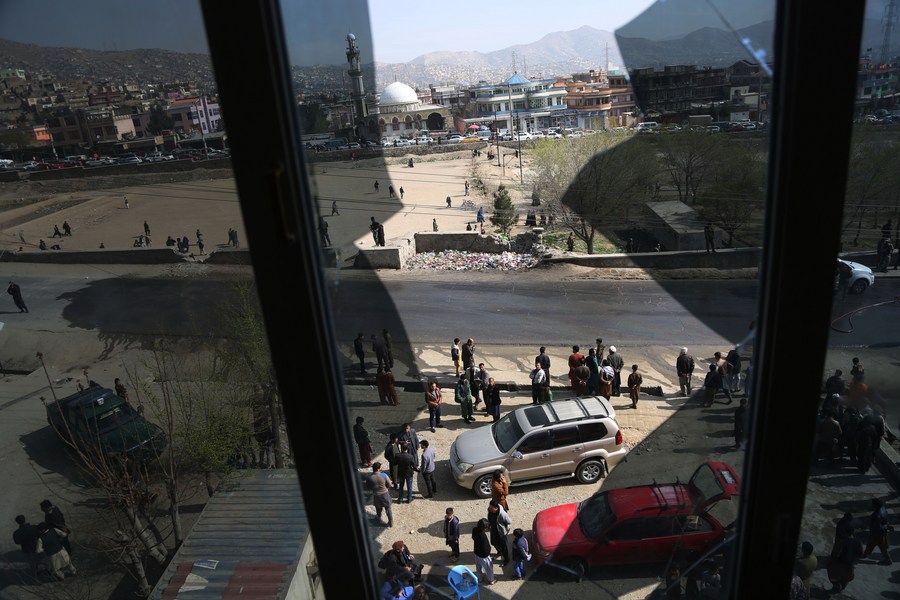
A CH-47 Chinook is loaded onto a U.S. Air Force C-17 Globemaster III at Hamid Karzai International Airport in Kabul, Afghanistan, August 28, 2021. /Xinhua
A CH-47 Chinook is loaded onto a U.S. Air Force C-17 Globemaster III at Hamid Karzai International Airport in Kabul, Afghanistan, August 28, 2021. /Xinhua
Editor's note: Mariam Shah is an Islamabad-based independent researcher in the field of conflict studies and military psychology. The article reflects the author's views and not necessarily those of CGTN.
Although the U.S. has completed its withdrawal from Afghanistan, the worst ever miscalculation by the U.S. administration and policy makers has led Kabul to this fate. Since the Taliban took over Kabul on August 15, we have witnessed two bomb blasts in Kabul, killing 200 people, including dozens of U.S. service members.
President Joe Biden has always been a proponent of ending the "endless war" in Afghanistan, but the manner in which the U.S. withdrew is terrible, and there will be repercussions for years to come. The U.S. withdrawal from Afghanistan is the worst of all the previous ones, including Saigon 1975.
Following the Kabul bomb blasts carried out by ISIS-K on August 26, the entire picture resembles more to the incident that took place in Beirut 1983, when a bomb blast killed hundreds of U.S. service members in the U.S. Marine Corps barracks just before the withdrawal.
It was clear from the start that the U.S. is going to leave, but the withdrawal could have been more systematic and planned in order to avoid what's happening now. At present, its total chaos and a looming humanitarian crisis clouds the region. There are a few grave miscalculations by the U.S. administration that led the entire region into the grip of sheer uncertainty.
First of all, the entire war on terror in Afghanistan lacked clear vision. United States came to Afghanistan with a vague plan, blurred objectives and strategy. It started off with a hyper-military adventurism, exaggerated data, lack of understanding of the ground realities and indigenous culture, dependence on the military power and overlooking the reconciliation signals during the initial years of this war.
The counter terrorism was the focus of this war but drastically it shifted to counter insurgency. U.S. came to fight the Al-Qaeda, started fighting the Taliban and then left the country at the hands of Taliban again.
As soon as the Kabul fell into the hands of Taliban, thousands of prisoners were released. This untimely and an unplanned U.S. withdrawal has created security havoc in Afghanistan and for the region, and it may witness an unprecedented amount of violence if not timely managed.

The site of a bomb attack in Kabul, Afghanistan, March 18, 2021. /Xinhua
The site of a bomb attack in Kabul, Afghanistan, March 18, 2021. /Xinhua
Besides, the ISIS-K in Afghanistan also got active even before the complete withdrawal. Al-Qaeda, ISIL and others are regional threats and somehow they nourished during the realm of the U.S. The unexpected Taliban takeover gave a huge legitimacy to the jihadi mindset, which is more violent and prone to terrorism.
The recent events have stimulated the jihadist victorious narrative for generations to come, and it's not going to stop here, keeping in view the leftover high-tech weaponry and the huge security fractures threatening the entire region.
Unfortunately, dozens of top policy research institutes and think tanks in the West couldn't provide one single practical solution to this dilemma in 20 years. Somehow, many Western scholars and institutes have got it quite wrong due to their inability to understand the ground realities of the indigenous Afghan society. It took two decades to realize that there is no military solution to the Afghanistan problem.
Moreover, Pakistan's point of view wasn't considered and taken well throughout this time. Pakistan's stance remained the same that Afghanistan requires a political solution which should be Afghan owned, with the involvement of all the stakeholders. Somehow, Pakistan was left out of the entire withdrawal and transition phase.
The over-confident Biden administration didn't consult Pakistan and other partners to maintain peace and move towards a steady withdrawal. Rather it became a clandestine operation, leaving behind a huge mess, knowing the fact that Pakistan will suffer from the consequences of this hasty pullout, more than any country.
This longest war in U.S. history is an absolute failure of U.S. foreign policy in Afghanistan. Even after spending billions, losing thousands of lives, United States is bound to accept that this war required a thorough political solution involving all the stakeholders, which should be Afghan-owned and Afghan-backed.
Two decades of war damaged regional peace and stability, and destroyed the very fabric of the Afghan society. Thousands of civilians and soldiers died for an extremely unfruitful war, innocent people will bear the brunt of the miscalculations committed by the policy makers and the repercussions of this whole misadventure will resonate for years to come.
(If you want to contribute and have specific expertise, please contact us at opinions@cgtn.com.)

